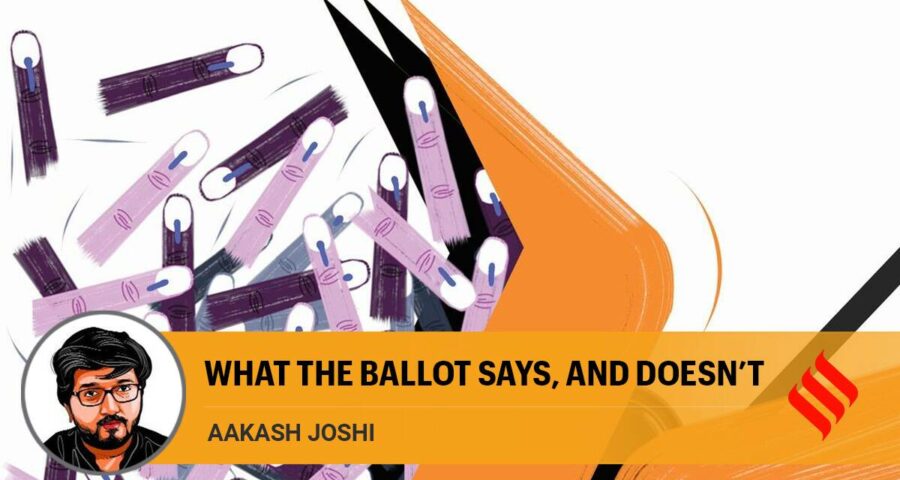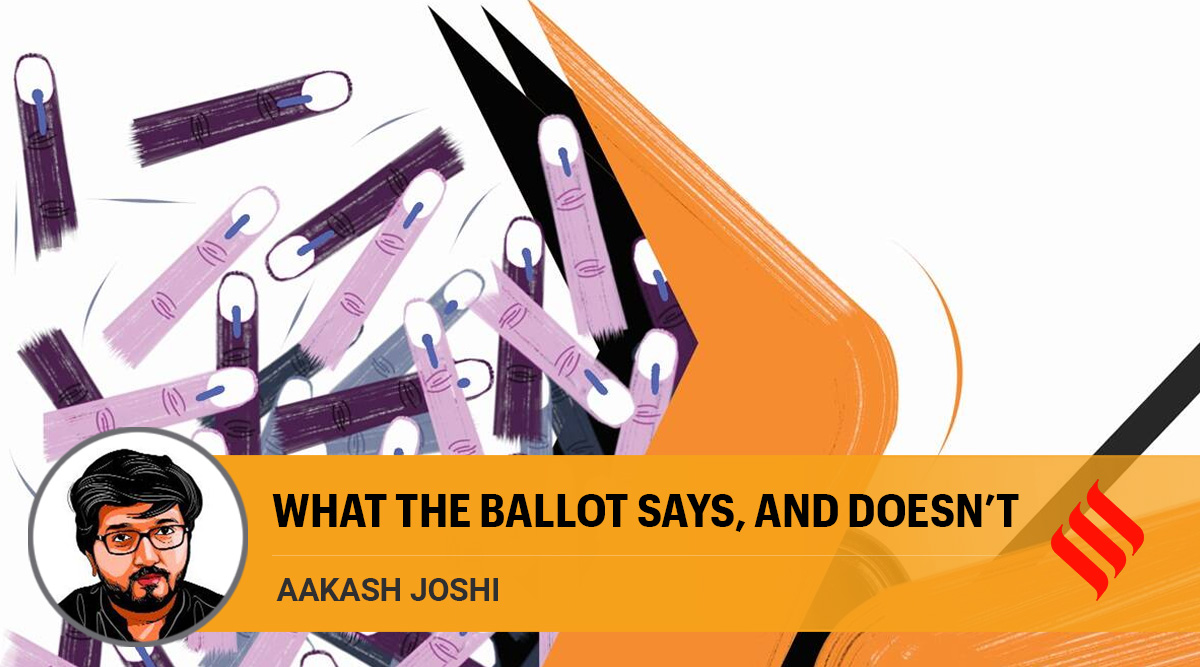Elections are increasingly seen as referendums on policies and ideologies. It is not as simple as that.
In March 2017, when the national economy was still reeling from the effects of demonetisation, the BJP swept the Uttar Pradesh assembly elections. That poll was seen as a referendum on what appeared to be failed policy: The abrupt cancellation of nearly nine-tenths of India’s legal tender did not achieve any of its purported aims, which ranged from ending terrorism and crime, to destroying black money and formalising and digitising the economy (cash, in the current pandemic-induced panic, is back with a bang). For both the winning party and its detractors, the electoral victory meant the end of political action, even debate, around the issue. For the BJP, it was a ringing endorsement of the policy and the PM; for others, the people had made the wrong choice, become irreversibly “Hindutva-ised”. On Sunday, as the election results from four states and Puducherry roll in, there is a danger that the mistakes of 2017 are repeated; that an election win or loss for the BJP — especially in West Bengal — could be seen as an endorsement of its handling of the pandemic or a complete indictment of Hindutva politics.
Over the last few weeks, a devastating health crisis — at least partially the result of an ill-prepared and inept government — has unfolded. On social media and WhatsApp groups, the anger at losing loved ones, at images that show how cheap human life and dignity can be in this country, is palpable. The political and governmental response to the pandemic, right from its onset, has followed a script that we are all too familiar with from the demonetisation exercise. The last-minute lockdown last March; the panic and subsequent death and suffering that migrant workers suffered were both avoidable. The only justifications for the pain caused by the Mahabharata-like war on the virus were that it would “break the chain” (it did not, clearly) and that India would use the respite from the virus to build up its medical infrastructure. Yet, if the last few weeks are anything to go by, that time has been wasted. And as people are dying, gasping for air, a Union minister has called the need for oxygen a “demand-side problem” and the Centre’s lawyer told the Delhi government in the High Court not “to be a cry baby”. And while vaccine shortage appears to be a real issue, the government is boasting of how many SMSes it has sent to those who have registered on the CoWin app in hope of a shot. Tweets critical of the government have been removed, others have been told not to politicise the issue when they demand accountability.
India’s politics is at a precipice. If we fall, the ability to govern may well have no bearing on who wins an election.
Before democracy became the most widely accepted form of government — especially after the wave of decolonisation post World War II — political legitimacy was a far more complex thing to determine. It came from gods, through “divinely ordained” kings, brute force and compacts between hereditary elites. Now, though, things are much simpler. At least 160 out of the 195 sovereign states claim to be democratic; their governments derive the right to rule in the ultimate analysis through the will of the people. The near-universal acceptance of elections as a basic prerequisite for ruling a nation-state comes in no small part from India’s success in this regard. In 1947, and for some decades thereafter, many around the world thought that a poor, diverse nation with the gaping wound of Partition inflicted on it at the moment of its birth would not survive the chaos of periodic elections. We proved them wrong. And if we could be democratic, any country could.
In 2014, and more emphatically in 2019, India voted in a single-party majority with a strong ideological commitment. Simply put, the difference between an ordinary mass party and an ideology-driven one is this: For the latter, the people must be changed to fit a vision of society; politics does not in its essence respond to the demands of the people. The 2019 general election win, for example, paved the way for the dismantling of some of the basic tenets of India’s political morality — federalism (the abrogation of Article 370, and now the LG replacing the elected government in Delhi) and secularism (a sitting prime minister inaugurating a temple on the site of a criminal demolition and the CAA enshrining in law an idea of differential access to citizenship rights based on religion), to name just two.
The question, then, is this: Is the obsession with elections actually undermining Indian democracy? Is it true, as Plato pointed out way back, that those most able to gain power are the least suited to wield it?
It is important to remember that every electoral victory does not mark an ideological change in the people. The BJP is certainly great at winning elections. And it wields divisiveness like a prizefighter. But a vote for the saffron party is not necessarily a vote against minorities. Many Indians do vote for change for its own sake or like to go with the perceived winner. Yet, this does not make them “a basket of deplorables”. Or life-long Sangh Parivar loyalists. Nor does a loss for the BJP in, say, Bengal or Assam, mean that a wave of Nehruvian secularism has swept eastern India.
What is worrying, though, is that the ruling party considers an election win — it outspends most of its political opponents manifold — as a ringing endorsement for its worst decisions. The Opposition, too, appears to limit its political action to electoralism. With Parliament barely functioning as a forum for debate and accountability, this has meant, essentially, that the ruling party and its leaders face no consequences, even for criminal negligence.
Indian democracy, in its essence and origins, is not the voice of a mob finding utterance in periodic elections. It is meant to be the will of the public. And while publics are self-conscious and reasonable, mobs are led from the outside, bending to the frenzied manipulations of great leaders who are often quite petty. What prevents the public from turning into a mob are the other institutions of democracy: Election commissions meant to ensure a level-playing field; a judiciary that is impartial and just; a media that enriches the public discourse and questions those in power. And while each of these institutions has failed to some degree, bent to pressure, hopefully, none of them has broken. If they have, elections may well pave the path for India to become an unconstitutional democracy, in opposition to the values and structures that protect Indians. And the current health crisis, in all its tragedy, could just be the beginning.
This article first appeared in the print edition on May 1, 2021 under the title ‘What the ballot says, and doesn’t’. Write to the author at [email protected].
Source: Read Full Article


